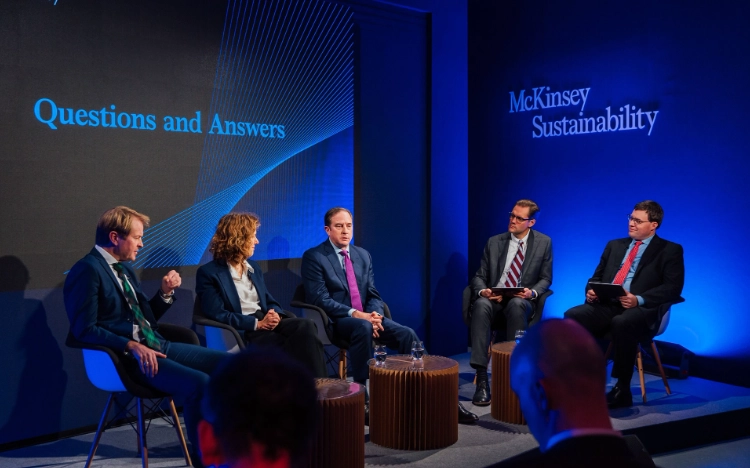Speak to anyone in your master’s cohort who is aspiring to launch a consulting career, and they’ll likely name one of the Big Three management consulting firms, such as McKinsey & Company, as their target company.
It’s no surprise, too, as the Big Three (which also include Bain and Boston Consulting Group) are consistently recognized as some of the best companies to work for worldwide. McKinsey placed fourth in Glassdoor’s annual ranking, a strong testament to employee satisfaction at the firm.
Not only that, McKinsey consultants can expect huge salaries and bonuses. With a business master’s degree under your belt, a McKinsey consultant's salary starts at an impressive $112,000.
However, this also means that competition for places is tough. To find out how you can get ahead, BusinessBecause caught up with Fikri Aulia Akbar, who landed a McKinsey consultant role six months before graduating from his Master in Management.
Prepare for the fast-paced role of a McKinsey consultant
Joining McKinsey as a business master’s graduate, you’ll likely start as a junior consultant, as Fikri did. This means you’ll work on a range of projects across different industries, geographies, and businesses.
In the first five months of his internship at McKinsey, Fikri worked on multiple projects in areas including data transformation strategy, private equity investment strategy, and sustainable energy transformation.
So, one things for sure, you need to be adaptable as a McKinsey consultant.
Fikri was prepared for this after studying his Master in Management at ESCP Business School in France, where he got the chance to test his abilities in a variety of professional settings.
Whilst studying, he undertook two internships working across different industries and functions—one in corporate banking at Standard Chartered and one in strategy at Bouygues Telecom Enterprises which helped build his resume for a career at McKinsey.
He also made sure to choose specializations that would give him an insight into the world of consulting.
“The ESCP MiM allowed me to gather deep knowledge about the consulting industry in Europe and grow my network among peers, alumni, and industry players in France, which aided me to better understand the industry challenges,” Fikri says.
Interested in developing your career in consulting? Our personalized Business Education Planner can help you plan out your pathway and navigate your next steps with confidence
Learn the skills every McKinsey consultant needs
Fikri’s day-to-day as a McKinsey junior consultant revolved around solving clients’ important business problems and working with them to achieve their goals in a sustainable way.
He worked with a team of 3-5 consultants whilst also collaborating with client teams and company leadership.
“As a consultant, we must be capable of determining how to reach certain objectives by navigating our resources, conveying our findings to the client in the most effective way, but also by bringing fresh ideas,” he says.
It’s clear then that if you want to land a role as a McKinsey consultant, you need to develop your skills in problem-solving, teamwork, and relationship-building. You also need a broad understanding of business challenges.
Studying the MiM gave Fikri a wealth of experience and examples to hone his skills. While studying, he explored real-life case studies and undertook projects that helped him understand how to formulate solutions to challenging problems.
“I had a project with a consulting firm about the competitive response strategy regarding Insurtech for a major insurance company. We had one month to establish the deliverable!” he says.
A MiM degree typically brings together people from a diverse range of nationalities and backgrounds. Fikri himself is from Indonesia and moved to France to study at ESCP.
“Being in a diverse class drove me to find common ground on how we should proceed with a class project and how to lead a project effectively leveraging the strength of each project member,” he says.
READ: McKinsey Consultant Salary | What Could You Earn At McKinsey & Company?

©McKinsey-Facebook
Impress during your McKinsey interview
The McKinsey interview process is rigorous. It involves several stages which each highlight key skills and aspects of your personality that prove you’re the right fit for the role.
You’ll undertake an hour-long digital assessment to test how you think and your problem-solving skills.
The personal experience interview is a chance to show your motivations and how you behave as a leader by sharing stories and examples from your career.
“Leadership is about driving your workstream and taking initiative if more is needed. Being able to do so correctly and methodically without being asked is crucial to impress,” says Fikri.
You’ll also face the McKinsey case interview. This is where you’ll discuss real-life situations and share with your interviewer how you would work to solve them, just like a McKinsey consultant does day to day.
“Solve the problem during the case interview in a structured and creative way,” Fikri advises.
Finally, there will also be an expertise interview where you’ll have to showcase your technical skills and the programs you know your way around. Here you must show how technology can be used when solving business cases.
But, Fikri says, it’s important to remember throughout the whole process that “at McKinsey, they want you to succeed!”
When interviewing for any role after your graduation, the recruiter’s aim is not to try and catch you out but to really understand you and why you want to work there.
“Build a rapport with your interviewer, get really familiar with the company you aspire to join and what it collectively thrives for,” says Fikri.



